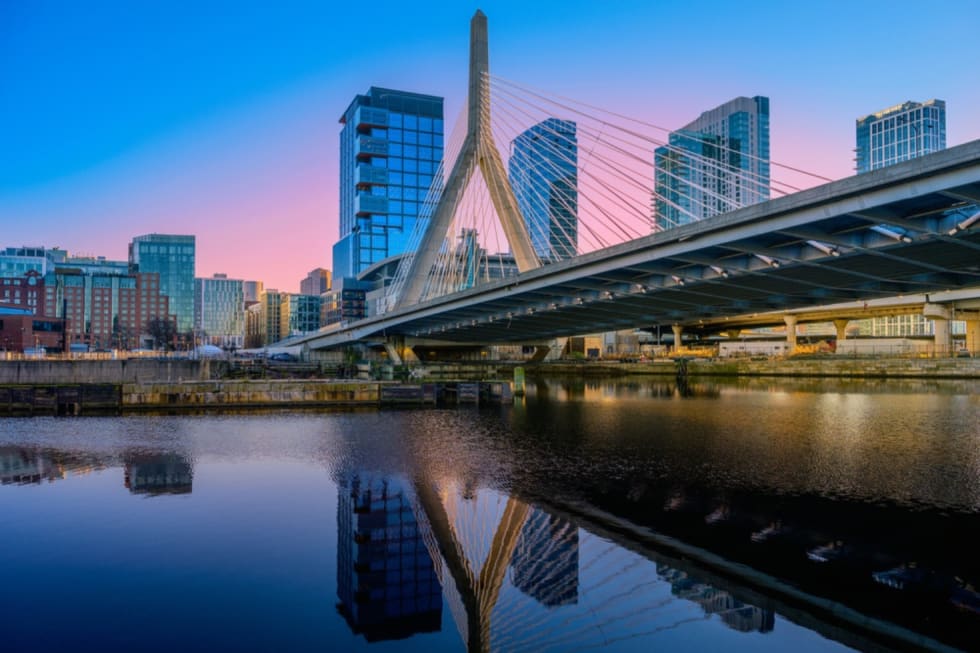- 38 units available
- Studio • 1 bed • 2 bed • 3 bed
- Amenities
In unit laundry, Golf room, Patio / balcony, Granite counters, Hardwood floors, Dishwasher + more

Massachusetts is a wonderful place to call home, offering an unbeatable mix of history, opportunities, and natural beauty. From the cobblestone streets of Boston to the scenic trails of the Berkshires, the state strikes a balance between modern urban living and access to outdoor adventures. World-class universities, a thriving healthcare system, and a robust job market draw professionals from around the globe, making Massachusetts a desirable but often pricey destination.
Compared to other high-cost cities like New York or San Francisco, cities in Massachusetts can feel slightly more accessible, especially in smaller ones like Springfield or Pittsfield, where housing and rent prices are far more affordable. While Boston and Cambridge come with steep living expenses, including rents well above the national average, the state also offers pockets of affordability that make it possible to enjoy a high quality of life without breaking the bank.
If you’re considering a move or simply want to understand what your money can buy across the state, this guide breaks down everything from rent and groceries to transportation and healthcare. Keep reading to discover how far your income can stretch and which areas offer the best value for your budget.
Massachusetts, home to major metropolitan areas like Boston and Cambridge, is known for its high cost of living, which is approximately 27.5% higher than the national average. Housing is the most significant contributor, being 75% higher than the national average, with a median home value of $525,800. Other expenses, such as groceries, utilities, transportation, and miscellaneous items, also exceed national averages, while healthcare costs are notably lower by approximately 9.8%.
The cost of living varies across the state. Boston, for instance, has an average rent of $1,869 for a one-bedroom apartment, reflecting its status as a cultural and economic hub. In contrast, Springfield offers more affordable options, with average rents around $594 for a one-bedroom apartment, appealing to those seeking budget-friendly living without sacrificing urban amenities.
| Category | State | U.S. Average |
|---|---|---|
| Overall | 127.5 | 100 |
| Grocery | 108.9 | 100 |
| Health | 90.2 | 100 |
| Housing | 175.0 | 100 |
| Median Home Value | $525,800 | $414,500 |
| Utilities | 112.9 | 100 |
| Transportation | 107.9 | 100 |
| Miscellaneous | 147.9 | 100 |
Nantucket has the highest cost of living in Massachusetts, with an overall index of 209, significantly surpassing both the state average of 127.5 and the national average of 100. The cost of housing significantly impacts this.
| Category | Nantucket | Massachusetts | U.S. Average |
|---|---|---|---|
| Overall | 209 | 127.5 | 100 |
| Grocery | 115 | 108.9 | 100 |
| Health | 108 | 90.2 | 100 |
| Housing | 442 | 175.0 | 100 |
| Median Home Value | $1,387,000 | $525,800 | $414,500 |
| Utilities | 112 | 112.9 | 100 |
| Transportation | 93 | 107.9 | 100 |
Pittsfield offers a cost-of-living index of 95.9, which is 4.1% lower than the national average of 100 and 24.8% lower than the Massachusetts average of 127.5. Notably, the median home value in Pittsfield is $233,700, significantly lower than the state's median of $525,800 and the national median of $414,500.
| Category | Pittsfield | State | U.S. Average |
|---|---|---|---|
| Overall | 95.9 | 127.5 | 100 |
| Grocery | 100.9 | 108.9 | 100 |
| Health | 107.9 | 90.2 | 100 |
| Housing | 74.8 | 175.0 | 100 |
| Median Home Cost | $233,700 | $525,800 | $414,500 |
| Utilities | 111.2 | 112.9 | 100 |
| Transportation | 85.4 | 107.9 | 100 |
| Miscellaneous | 117.5 | 147.9 | 100 |

Rent in Massachusetts varies widely by city, with the highest median prices seen in Cambridge. A one-bedroom apartment in Cambridge rents for $2,683, while a two-bedroom averages $3,109—significantly higher than the more affordable cities like Springfield, where a one-bedroom rents for just $594 and a two-bedroom for $1,182. Boston, the state’s capital, has a median rent of $1,869 for a one-bedroom apartment and $2,298 for a two-bedroom apartment, placing it among the pricier locations in the state, although still below Cambridge.
Worcester and Lowell represent mid-range options, with one-bedrooms renting for $1,093 and $1,297, respectively. Compared to national averages, where recent data places the median rent for a one-bedroom apartment closer to $1,234, cities like Springfield remain significantly below average, while places like Cambridge and Boston are well above average. These rent patterns reflect a familiar trend: high housing demand and limited space in urban centers like Cambridge drive up prices, while smaller or post-industrial cities like Springfield offer more budget-friendly options.
| City | Median One-Bedroom Rent | Median Two-Bedroom Rent |
|---|---|---|
| Boston | $1,869 | $2,298 |
| Worcester | $1,093 | $1,477 |
| Springfield | $594 | $1,182 |
| Cambridge | $2,683 | $3,109 |
| Lowell | $1,297 | $1,717 |
The average rent for a one-bedroom apartment in Massachusetts is $1,459, though prices vary dramatically by location. In cities like Springfield, rents start as low as $594, while upscale areas such as Cambridge can exceed $2,600, depending on the neighborhood and included amenities.
The average rent for a two-bedroom apartment in Massachusetts is approximately $1,882. However, rental prices vary significantly across the state. In Boston, the average rent for a two-bedroom unit is around $2,298, while in Worcester, it's approximately $1,477. These variations are influenced by factors such as neighborhood desirability, proximity to amenities, and the property’s condition.
The median value of a home in Massachusetts is $525,800, though prices vary widely across the state. In cities like Cambridge and Boston, buyers can expect to pay a premium, with median home values at $1,040,500 and $710,400, respectively. More affordable options exist in Springfield, where the median home cost is $222,700, while mid-range cities like Worcester and Lowell offer a balance between price and access to amenities.
| City | Median Value of Housing |
|---|---|
| Boston | $710,400 |
| Worcester | $339,500 |
| Springfield | $222,700 |
| Cambridge | $1,040,500 |
| Lowell | $395,100 |

Determining the salary needed to live comfortably in Massachusetts depends on various factors, including household size and lifestyle. According to the MIT Living Wage Calculator, a single adult requires an hourly wage of $28.88 to cover necessities, while a family of four (two working adults and two children) needs $37.71 per hour per adult. These figures account for essential expenses such as food, housing, and healthcare but do not include costs related to travel, savings, or debt repayments.
In comparison, the U.S. Census Bureau reports that the median household income in Massachusetts is $101,341, which is higher than the national median household income of $78,538. This suggests that, on average, Massachusetts residents earn more than their counterparts in other states, potentially offsetting the state's higher cost of living.
When budgeting for housing, the 30% rule is a standard guideline, suggesting that no more than 30% of your gross income should be allocated to rent. Given that the median rent in Massachusetts is approximately $1,757 per month, you would need an annual income of at least $70,280 to afford this comfortably. This translates to a monthly income of about $5,857 and an hourly wage of approximately $33.79, assuming a 40-hour workweek.
Comparing these figures, the state's median household income of $101,341 is significantly higher than the calculated income needed to afford median rent comfortably. However, it's important to note that individual circumstances vary, and many residents find ways to manage housing costs through various means. To help you find apartments within your budget, consider using our rent calculator, which can assist in identifying housing options that align with your financial situation.
Transportation expenses in Massachusetts vary based on household composition. According to the MIT Living Wage Calculator, a single adult incurs approximately $9,708 annually in transportation costs, averaging about $809 per month. For a family of four with two working adults and two children, transportation costs rise to approximately $16,285 per year, or about $1,357 per month. These estimates encompass expenses such as vehicle maintenance, fuel, insurance, and public transit fares.
Massachusetts is known for its dense urban centers and extensive suburban areas, leading to a strong driving culture. Major cities like Boston often experience significant traffic congestion, especially during peak commuting hours. While the Massachusetts Bay Transportation Authority (MBTA) offers public transit options, including buses, subways, and commuter rails, certain areas may have limited coverage or less frequent service, resulting in a reliance on personal vehicles.
In terms of walkability and access to alternative transportation, Boston ranks favorably. The city boasts a Walk Score of 83, indicating that many errands can be accomplished on foot. Its Transit Score stands at 72, reflecting a robust public transportation system, and a Bike Score of 69 suggests that biking is a viable option for many residents. Neighborhoods such as Downtown, Back Bay, and the South End offer particularly high walkability and transit accessibility, making them suitable for those who prefer to minimize car usage.
According to the MIT Living Wage Calculator, annual food expenses in Massachusetts are approximately $4,949 for a single adult and $14,508 for a family of four (two working adults and two children). This translates to about $412 per month for an individual and $1,209 per month for a family.
Dining out in Massachusetts, particularly in cities like Boston, can be relatively expensive. According to Numbeo, the average cost for a three-course meal for two at a mid-range restaurant in Boston is around $120. Grocery prices also reflect the higher cost of living; for example, a loaf of fresh white bread costs approximately $3.73, and a pound of chicken fillets is about $6.19.
Massachusetts boasts a rich culinary scene with popular local dishes such as clam chowder, lobster rolls, and baked beans. While enjoying these specialties can enhance your experience, frequent dining out can significantly impact your budget. Balancing home-cooked meals with occasional indulgences in local cuisine can help manage food expenses effectively.

Child care costs in Massachusetts are notably higher than the national average, posing significant financial challenges for families. According to the MIT Living Wage Calculator, annual child care expenses are approximately $22,352 for one child and $39,767 for two children. In contrast, the national average price of child care in 2023 was $11,582, equating to 10% of a married couple with children’s median household income and 32% of a single parent with children’s median household income. This disparity underscores the financial strain on Massachusetts families, as the U.S. Department of Health and Human Services recommends that child care costs should not exceed 7% of a family's annual income.
According to the MIT Living Wage Calculator, annual healthcare expenses in Massachusetts are approximately $3,887 for a single adult and $11,230 for a family of four comprising two working adults and two children. This indicates that families face healthcare costs nearly three times higher than those of single adults. Despite these expenses, Massachusetts boasts a high rate of health insurance coverage, with over 97% of residents insured, the highest in the nation.
In Massachusetts, monthly utility expenses can vary based on location and usage. For a standard 915-square-foot apartment, basic utilities—including electricity, heating, cooling, water, and garbage—average approximately $195.85 in Boston, which is slightly below the national average of $208.22 for similar services. Internet services with speeds of 60 Mbps or more and unlimited data typically cost around $71.51 per month in Boston, aligning closely with the national average of $71.47. Mobile phone plans, offering unlimited calls and at least 10 GB of data, average approximately $58.93 per month in Boston, compared to the national average of $57.17.
It's important to note that Massachusetts experiences significant seasonal weather variations characterized by cold winters and warm summers. These fluctuations can result in higher utility costs during peak heating and cooling periods. For instance, in Boston, winter temperatures can drop below freezing, which increases heating expenses, while the summer months may necessitate the use of air conditioning. Therefore, it's advisable to budget for these seasonal changes to manage utility expenses effectively.

Fitness and entertainment options in Massachusetts come with a wide range of price tags. In Boston, a gym membership averages around $80.38 per month, making it one of the more expensive cities for fitness. Movie tickets cost about $16 each, which is above the national average and can add up quickly for families or frequent outings.
Fortunately, Massachusetts also offers countless free and affordable ways to stay active and entertained. The Charles River Esplanade is a local favorite for walking, jogging, and yoga, while the Bay Circuit Trail and the Appalachian Trail provide over 200 miles of scenic hiking and biking routes. History buffs can explore the Freedom Trail—a 2.5-mile path linking 16 historic sites in Boston—at no cost. Additionally, museums like the Harvard Art Museums and the MassArt Art Museum offer free admission days or suggested donation entry, making culture and learning accessible to everyone. For more ideas, check out this guide to things to do in Boston.
Massachusetts tax rates include a state sales tax rate of 6.25%, with no additional local sales taxes, resulting in a consistent rate across the state. The state employs a graduated individual income tax system, with rates ranging from 5% to 9%. Notably, a 4% surtax applies to annual income exceeding $1 million, effectively increasing the top marginal rate for high earners.
These tax policies have a significant impact on the overall cost of living in Massachusetts, as residents must factor in both the statewide sales tax and income tax obligations when budgeting their expenses.
The Massachusetts job market is experiencing notable shifts in 2025. The state's unemployment rate rose to 4.3% in February, up from 4.2% in January and 3.8% a year earlier, surpassing the national average of 4.1%. This uptick is partly attributed to significant layoffs in the tech sector, which accounts for approximately 8% of the state's workforce. In 2024, nearly 5,000 tech jobs were cut in Massachusetts, with major companies like Wayfair, Toast, and iRobot reducing their staff amid restructuring and increased automation.
Despite these challenges, certain sectors in Massachusetts continue to exhibit strength. The education and health services sector has seen significant growth, adding 11,100 jobs over the year, making it the most significant contributor to employment gains in the state. Additionally, the life sciences industry remains robust, with employment surpassing 140,000 in 2023 and projections indicating the addition of 38,000 new jobs by 2033.
From coastal charm to bustling city life, Massachusetts offers something for everyone. Whether you're drawn to the historic streets of Boston, the academic energy of Cambridge, or the affordability of cities like Worcester and Springfield, there are options to fit a wide range of lifestyles and budgets. With the right approach, you can find an apartment that balances location, amenities, and cost—whether you're relocating across the state or moving from out of town.
Ready to find your next apartment? Start your Massachusetts rental search with Apartment List and discover a place that truly feels like home. With us, you’ll spend five minutes and save 50 hours searching.
Rent is high in Massachusetts due to a combination of strong demand, limited housing supply, and economic concentration in key metropolitan areas, such as Boston and Cambridge. These cities are home to top universities, hospitals, and tech companies, attracting a steady influx of students and professionals. High land and construction costs, strict zoning laws, and competition for housing in desirable neighborhoods further drive up prices. As a result, places like Cambridge see one-bedroom rents exceeding $2,600, while even mid-sized cities like Boston average close to $1,900 for similar units.
Springfield has the cheapest rent in Massachusetts, with a median price of $594 for a one-bedroom apartment and $1,182 for a two-bedroom apartment. This is well below the state average of $1,459 for one-bedroom units and $1,882 for two-bedroom units.
Massachusetts is expensive due to its high housing costs, strong job market, and concentration of top-tier institutions. The housing index is 75% higher than the national average, primarily driven by limited space, strict zoning laws, and strong demand in cities like Boston and Cambridge. Additionally, the state hosts leading universities, hospitals, and tech companies, which push up wages and living costs with them.
As of 2024, Massachusetts has an estimated population of 7,136,171, according to the latest data from the U.S. Census Bureau.
As of 2025, Massachusetts maintains a minimum wage of $15.00 per hour for most workers. While this wage is among the highest state minimums in the U.S., it doesn't fully offset the state’s high cost of living, which is 27.5% higher than the national average.

In unit laundry, Golf room, Patio / balcony, Granite counters, Hardwood floors, Dishwasher + more
In unit laundry, Golf room, Patio / balcony, Dishwasher, Pet friendly, Garage + more